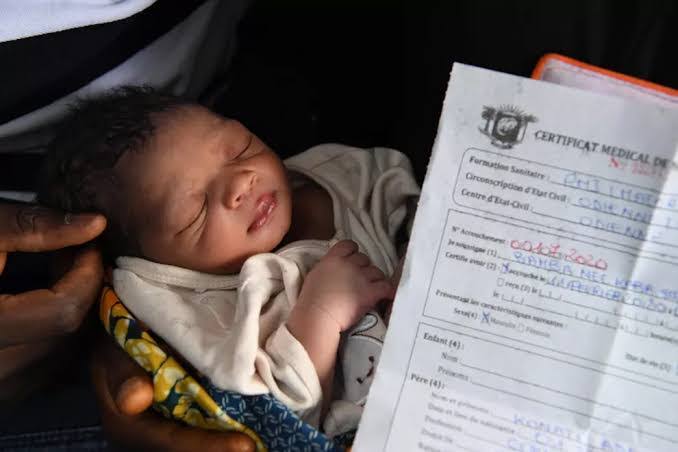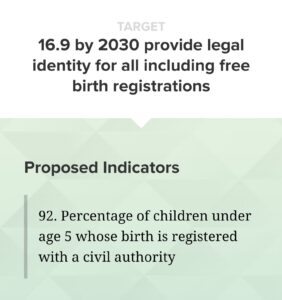
Every Nigerian child deserves a legal identity and the processes that guarantees it must be foolproof.
Undoubtedly, Nigeria’s journey towards comprehensive birth registration has taken a significant leap with the introduction of the Electronic Civil Registration and Vital Statistics System (e-CRVS).
Launched in November 2023, this system pulled through a collaboration between the National Population Commission (NPC) and UNICEF to enhance the country’s civil registration framework.

Historically, Nigeria has struggled with low birth registration rates, with only 43% of children under five registered as of recent years.. This gap is particularly pronounced in rural areas where access to registration centers is limited and awareness about the importance of birth registration is low. However, the digitalization of birth registration was created to change this narrative.
E-Birth Registration Journey
Recall that in November 2023, President Bola Tinubu launched the electronic Civil Registration and Vital Statistics System (e-CRVS), a digital platform managed by the NPC. This platform documents birth and stillbirth, birth attestation, adoption, marriage notification, divorce notification, migration, and death.

The e-CRVS is also meant to curb fraud.
The NPC Comptroller for Eti Osa Local Government Area, who highlighted the issue of counterfeit certificates during a field trip to Sangotedo Primary Health Centre (PHC) area in Lagos explained that e-registration is meant to ensure transparent activities and eliminate the tactics of fraudsters.
He urged parents or informants to visit the five designated e-registration centers and interact with NPC officers.
According to Isiaka, over 1,363 registrations have been completed so far this year, noting that e-registration is less cumbersome than manual registration.
Importance of E-Birth Registration
E-birth registration is crucial for generating accurate statistics necessary for national planning and development.
Chief of UNICEF Field Office for South West Nigeria, Celine Lafoucriere that without a birth certificate, a child remains “invisible” and excluded from vital services.

This kind of invisibility then hampers efforts to achieve the Sustainable Development Goals (SDGs), particularly Goal 16.9, which aims to provide legal identity for all by 2030.

Lafoucriere states:
E-birth registration is crucial for national planning and development,” she stated. “It guarantees that each child is recognized and accounted for, which is essential for effective governance and resource allocation.”
Recall that UNICEF and the NPC have also launched community-driven efforts to raise awareness about the importance of birth registration. These campaigns emphasize the benefits of having a birth certificate, such as access to education, healthcare, and legal identity, which are crucial for a child’s future.
Moreover, the establishment of the CRVS National Coordination Committee ensures that the e-CRVS system is effectively managed and continuously improved. This committee is tasked with steering the system towards achieving Nigeria’s goal of universal birth registration by 2030, in line with the Sustainable Development Goals (SDG) 16.9 for legal identity for all.
Why PHCs Are Key To E-Birth Integration
Primary Health Care (PHC) centers play a pivotal role in this transformation. These centers are often the first point of contact for mothers and newborns, making them ideal locations for integrating birth registration services.

By coupling birth registration with other essential health services such as immunizations, PHC centers can ensure that registration becomes a routine part of postnatal care.
For instance, during Maternal Neonatal Child Health Weeks (MNCHWs) and supplemental immunization activities, PHC centers are now equipped to register births using digital applications. This approach not only simplifies the registration process but also ensures that no child is missed. The use of digital tools eliminates the cumbersome paper-based methods, reduces errors, and prevents double registrations.
The impact of these initiatives is already evident. In states like Benue, the introduction of digital birth registration has significantly improved coverage rates. Mothers like Rhoda Egbe, who previously faced challenges in registering their children, now find the process stress-free and time-saving.
Community Impact and Testimonials
In New Garage area of Ibadan, the Oyo State capital, a healthcare personnel, Mrs. Grace Omonije stressed that e-birth registration plays a vital role in establishing a child’s legal identity and helps the government accurately assess the need for schools and other developmental priorities within communities.
On the other hand, the Director of The National Population Commission in Oyo State, Mr. Akin Oyetunde, explained that every local government has its own birth and death registration centers, with no local government having less than three registration centers.
Primary health care centers in Nigeria play several key roles in e-birth registration, including:
- Accessibility: They provide accessible locations for parents to register births, especially in rural and underserved areas.
- Data Collection: PHC workers collect vital information needed for birth registration, such as the child’s name, date of birth, parents’ details, and place of birth.
- Awareness and Education: They educate parents about the importance of birth registration and the process involved.
- Verification: They verify the authenticity of the information provided, ensuring accurate and reliable data for the e-birth registration system.
- Integration with Health Services: They integrate birth registration with other health services, such as immunization and maternal health programs, to ensure comprehensive care and accurate records.
- Record Keeping: They maintain records of births and facilitate the digital entry of this data into the national database.
- Support and Assistance: They assist parents with any issues or challenges they face during the registration process.
- Collaboration: They collaborate with the National Population Commission (NPC) and other relevant agencies to ensure efficient and effective birth registration.
A UNICEF Child Protection Specialist, Dennis Onoise who spoke on the roles of PHCs in South West States and their one million children for e-birth registration target, explained that this initiative is not only interested in registering births but also linking each child’s birth certificate with the National Identification Number (NIN), thereby enhancing the accuracy and reliability of the entire process.
What the Key Performance Indicators Should Be For PHCs in Achieving Rapid Registration
Primary Healthcare Centers must embrace these key indices to gauge and improve their performances if set set e-birth targets must be met in record time.
- Registration Coverage Rate: This is the aggregation of percentage-births registered within a specific period compared to the estimated number of births.
- Timeliness of Registration: This entails recording the average time taken from birth to registration.
- Data Accuracy and Completeness: The percentage of registrations with complete and accurate information.
- Parent/Guardian Awareness and Engagement: The level of awareness among parents/guardians about the importance of birth registration, often measured through surveys.
- Accessibility and Utilization: The number of parents/guardians using primary health care centers for birth registration services.
- Staff Training and Competency: The percentage of health care staff trained in the e-birth registration process and their competency levels.
- System Integration: The effectiveness of integrating birth registration with other health services (e.g., immunization, maternal care).
- Data Entry Efficiency: The speed and accuracy of entering collected birth data into the national digital system.
- Error Rates: The frequency of errors in the registration process, such as duplicate entries or incorrect information.
- Stakeholder Collaboration: Stocktaking the effectiveness of collaboration between primary health care centers and the National Population Commission (NPC) or other relevant agencies.
- User Satisfaction: The satisfaction levels of parents/guardians with the birth registration process, typically measured through feedback surveys.
Expansion and Accessibility

Primary health care centers are at the forefront of promoting e-birth registration in Nigeria.
By providing accessible registration points, integrating technological solutions, and fostering community involvement, these centers are helping to ensure that every Nigerian child receives a legal identity.
This initiative is already paving the way for better planning, development, and protection of children’s rights, aligning with global goals for sustainable development.
